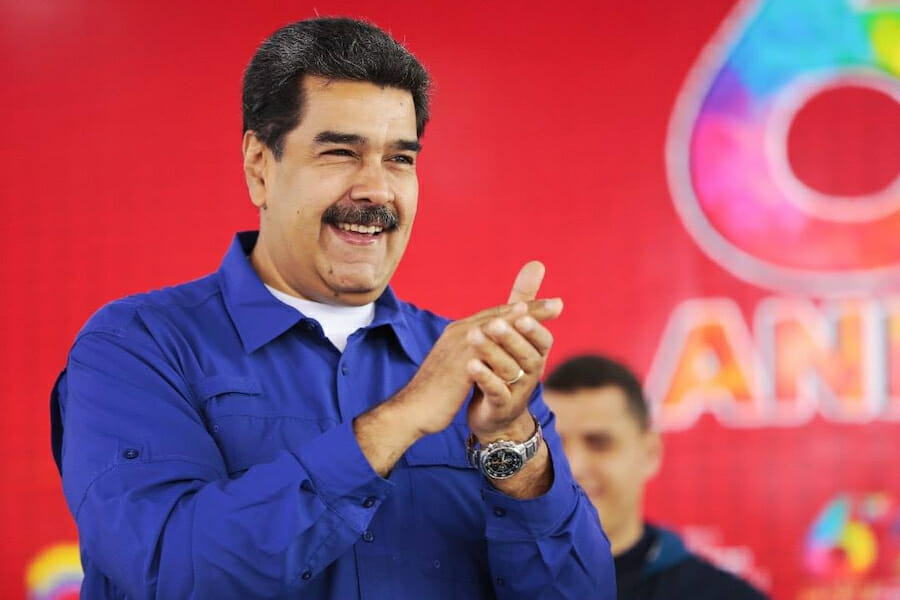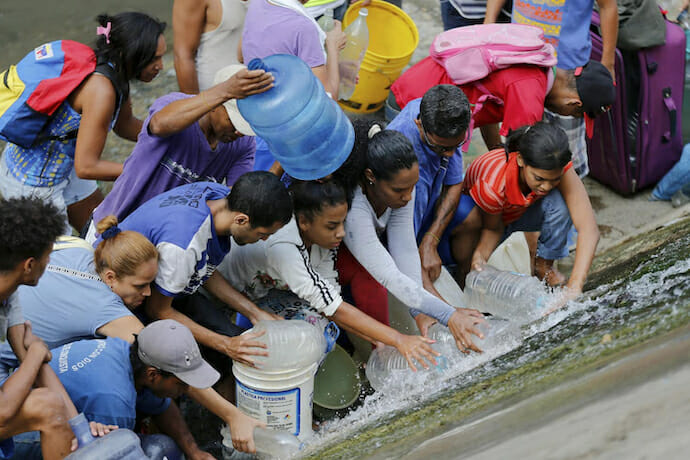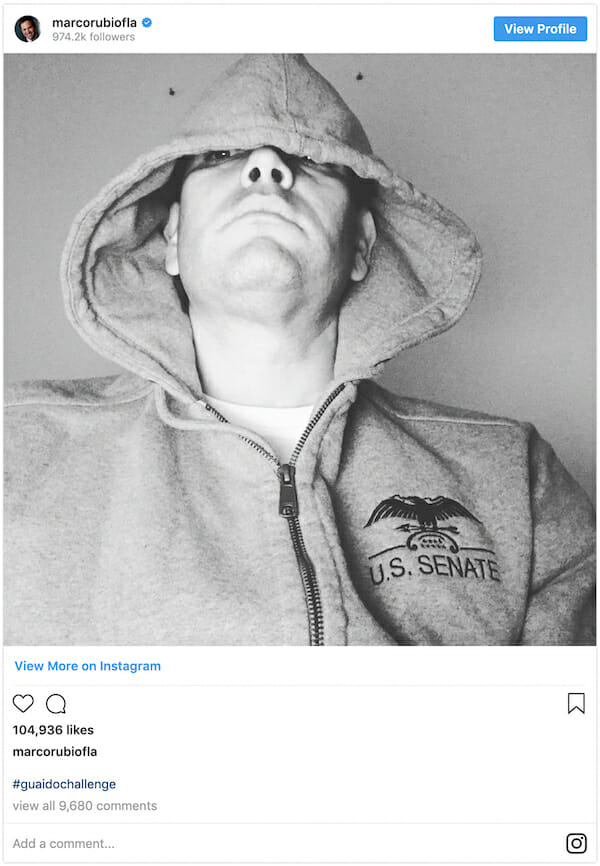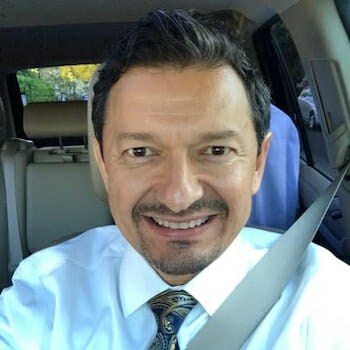
Venezuela’s Crisis is a Tragedy, but Comedy Gold for Satire, Cartoons and Memes
Thirty-nine journalists have been detained in Venezuela this year, far more than in any other Latin American country, according to the Caracas-based Institute for Press and Society.
Their arrests are part of the government’s crackdown on journalists who report on the country’s escalating instability as President Nicolás Maduro fights to retain power against the opposition’s internationally-backed effort to oust him.
Local reporters have seen early morning raids of their homes, arrests, rushed and legally questionable trials for charges of “inciting violence.” They’ve been given verdicts ranging from self-censorship to jail time. Several foreign reporters – including Univision TV anchor and U.S. citizen Jorge Ramos – have been deported from Venezuela.
In this repressive environment, journalists are finding ways to avoid censorship and still cover the country’s crisis.
Digital news sites and social media platforms, in particular, have become key platforms for informing the public. Using humorous memes and political satire, they publicize government abuses, protest daily humiliations like water shortages and blackouts, and resist Maduro’s autocratic regime.
Laugh so you don’t cry
Government pressure on the Venezuelan media dates back to the late President Hugo Chávez, who took office in 1999. Over three administrations, Chávez used his power and immense popularity to chip away at the separation of powers and undermine press freedom.
Maduro has continued this tradition since succeeding Chávez, his political mentor, in 2013. He has also overseen Venezuela’s slide into humanitarian crisis, economic collapse, and political chaos. To quash protests, his government has turned increasingly authoritarian, violently repressing dissent and silencing journalists.
Under such circumstances, Venezuela’s turn toward satirical news recalls an old saying that’s grown popular in these difficult days: “Me río para no llorar” – laugh so you don’t cry.

A satirical website called “El chigüire bipolar” – the bipolar capybara, a name that references a giant South American rodent – recently won an international prize for “creative dissidence.”
Its animated series, “La isla presidencial,” “The Presidential Island,” which began in 2010, has Venezuela’s leftist strongman leader – first Hugo Chávez, now Nicolás Maduro – stranded on a desert island with other presidents of Mexico, Argentina, Bolivia, Brazil, Nicaragua, Colombia and with the king of Spain.
“The Presidential Island” portrays Maduro as illiterate and overweight, a blundering simpleton who is overly proud of his mustache and incessantly invokes the late Hugo Chávez.
In one episode from the current season, Maduro takes it upon himself to ration water during a drought. His poor handling of water distribution leads the other presidents to revolt. They find water sources on their own.
Maduro declares it a “coup d’etat” and insists that it’s all an “imperialist” plot – just as he has done during Venezuela’s repeated recent national blackouts.
Political cartoonists are another front of the Venezuelan media’s resistance to oppression by the Maduro regime.
Cartoonist and graphic artist Rayma Suprani was dismissed from the national newspaper El Universal in 2014 after a drawing that mocked Maduro’s authority. She portrayed Chávez’s signature as a flatline on a hospital heart-rate monitor as if to say, “Venezuela’s Socialist revolution is dead.”
Being fired didn’t stop Suprani from drawing. Today, her satirical cartoons and drawings are widely circulated online, offering powerful visual depictions of the country’s always worsening news.
Juan Guaidó, meme hero
Venezuela has a long history of satire during times of political and economic crisis.
First published in 1892, “El cojo illustrado” – “The Illustrated Cripple” – was a Venezuelan magazine that used satirical drawings and articles to address political topics without explicitly referring to the government in power.
During its 23 years in circulation, the publication skewered everything from current events to Venezuelan identity politics – always obliquely, using sly humor.
Today, stand-up comics are more explicit, using dark humor to expose the government’s policy missteps and predictable rhetoric.
Laureano Márquez, a Venezuelan humorist, political scientist, and author with 3.43 million Twitter followers, irritates the government from the safety of Spain, where he now lives.
“Russia votes at UN against intervention in Venezuela,” he tweeted on March 1. “Except if it’s Russian, Chinese or Cuban.”
Rusia vota en la ONU que no haya intervención en Venezuela, salvo la rusa, la cubana y la china.
— Laureano Marquez (@laureanomar) March 1, 2019
Communist Russia, China, and Cuba are the Maduro regime’s three most powerful international allies. More than 50 countries – including the United States, Colombia, and Canada – back National Assembly leader Juan Guaidó’s bid to unseat the president.
Even Guaidó, who appears to have massive popular support for his challenge to Maduro, has also been the target of online ribbing in Venezuela.
On Jan. 22, security footage from the Hotel Lido in Caracas surfaced that appeared to show Guaidó meeting with officials from the Maduro regime. That would have been an unpopular move among opposition supporters.
But the grainy video simply showed an unidentified person wearing a baseball cap and gray hoodie, walking with his hands in his pockets, followed by Guaidó’s aide Roberto Marrero. It could be anyone, Guaidó’s supporters reasoned.
The hashtag #GuaidoChallenge quickly went viral on Instagram as users posted photographs and videos of themselves, cartoon characters and random people posing in hats and hoodies. One Instagram user dressed up his dog in a hat and sweatshirt and quipped, “It’s a GuaiDog!”
Even former Florida Governor Jeb Bush and U.S. Senator Marco Rubio joined the #GuaidoChallenge.

That had been unacceptable to Maduro. The next day, Guaidó declared himself interim president of Venezuela, triggering the power struggle that has plunged the country into chaos.
There’s nothing funny about Venezuela’s tragedy. But humor is among the few ways Venezuelans have left to cope with their desperation and frustration.
They’re laughing, as the saying goes, so they don’t cry.
This article was originally published on The Conversation. Read the original article.

